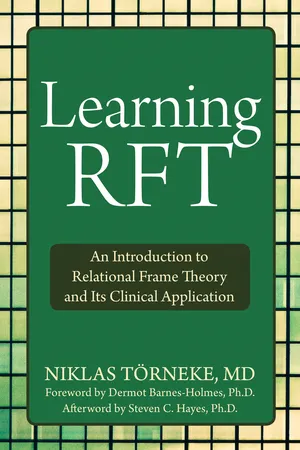About this book
Relational frame theory, or RFT, is the little-understood behavioral theory behind a recent development in modern psychology: the shift from the cognitive paradigm underpinning cognitive behavioral therapy to a new understanding of language and cognition. Learning RFT presents a basic yet comprehensive introduction to this fascinating theory, which forms the basis of acceptance and commitment therapy. The book also offers practical guidance for directly applying it in clinical work.
In the book, author Niklas Törneke presents the building blocks of RFT: language as a particular kind of relating, derived stimulus relations, and transformation of stimulus functions. He then shows how these concepts are essential to understanding acceptance and commitment therapy and other therapeutic models. Learning RFT shows how to use experiential exercises and metaphors in psychological treatment and explains how they can help your clients. This book belongs on the bookshelves of psychologists, psychotherapists, students, and others seeking to deepen their understanding of psychological treatment from a behavioral perspective.
Tools to learn more effectively

Saving Books

Keyword Search

Annotating Text

Listen to it instead
Information
Table of contents
- Contents
- Foreword to the U.S. Edition
- Foreword to the Swedish Edition
- Acknowledgments
- A Personal Word of Introduction
- 1 Radical Behaviorism and Fundamental Behavior Analytic Principles
- 2 Thinking and Human Language
- 3 Is the Power of Thinking a Clinically Relevant Issue?
- 4 Derived Relational Responding as the Fundamental Element in Human Language
- 5 Analogies, Metaphors, and Our Experience of Self
- 6 Relational Framing and Rule-Governed Behavior
- 7 The Dark Side of Human Languaging
- 8 Learning Theory and Psychological Therapies
- 9 General Guidelines for Clinical Behavior Analysis
- 10 Altering the Context with a Focus on Consequences
- 11 Altering the Context with a Focus on Antecedents
- Afterword
- References
